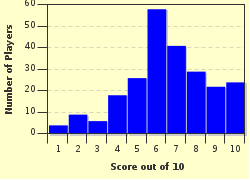Quiz Answer Key and Fun Facts
1. The Christian tradition of communion is based on the last supper, when Jesus fed (unleavened) bread and wine to his disciples, asking that they eat and drink in remembrance of him. This occurred during the celebration of which Jewish holiday?
2. Where did Jesus ask his disciples to go for the last supper meal?
3. The Last Supper has been memorably depicted in Leonardo da Vinci's famous painting of the same name. In this painting, which disciple is shown as having his elbows on the table?
4. The Catholic church has traditionally believed that when believers partake of the bread and wine during communion, they are actually eating the body of Christ and drinking his blood. What is the name for this belief?
5. Martin Luther questioned many Catholic beliefs and practices when he posted his famous 95 theses. Luther's belief about communion was that Christ was present, but the bread and wine did not actually turn into his body and blood. What analogy did Luther use to explain his belief?
6. Which modern-day Christian group does not practice communion?
7. Communion is often known as the Eucharist. This term is derived from the Greek word eucharista, which means what?
8. The Presbyterian view of communion is a middle ground between the extremes of the Roman Catholic view, on the one hand, and the Anabaptist view, on the other hand. Who is the spiritual forefather who first articulated this Presbyterian view?
9. In a 78-page encyclical letter issued in April of 2003, Pope John Paul II wrote about the issue of communion in the Catholic church. Which group was singled out for special attention in this encyclical?
10. The issue of communion burst into the headlines in the United States in 2004 when one of the candidates for national office was denied communion by the Catholic Church because of his support for abortion rights. Who was this candidate?
Source: Author
chessart
This quiz was reviewed by FunTrivia editor
CellarDoor before going online.
Any errors found in FunTrivia content are routinely corrected through our feedback system.

